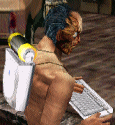|
I certainly have all those concerns--I've actually typed up a list of questions for my wife to ask the breeder that will make/break my enthusiasm for this particular litter. It's my tacit understanding that they are not breeding for profit, and this is the only litter they've had. I don't think they are breeders. Are the biggest concerns among the breeding primarily for health issues, temperament, or both?
|
|
|
|

|
| # ? May 14, 2024 18:30 |
|
I would want to know why they decided to breed these two particular dogs. Do they simply have a male and female in the house and decided to put them together and see what happened? Have the dogs been looked at by impartial third parties and decided to be good examples of the breed? (This can be done via showing in sports, working, conformation...) What sort of weaknesses in the sire/dam are trying to be rectified in the breeding of this litter? No dog is perfect, but ideally a sire's weaknesses can be compensated for by the dam's strengths and vice versa. They should be breeding for the betterment of the breed. That includes health, temperament, maintaining the breed's working roots and everything else that made poodles into the breed today which you've decided you want to make part of your family. We don't care if it's just going to be a pet -- there will always be "pet quality" puppies in well bred litters. But the breeder shouldn't only be breeding for pets. That's kind of ignoring what made the breed great to begin with. I'm sure you can find a nice dog from a BYB who may live a long, happy, healthy life. Though it's one of those situations where you can express your motivations for getting a dog by giving your money and support to a breeder who, in your opinion, is doing things the right way and doing a service to the breed.
|
|
|
|
LeeMajors posted:I don't think they are breeders. Temperament is kind of a health issue. Most likely, they'll tell you both parents are friendly, healthy dogs. You should still walk away now and save yourself the time (and prevent yourself from getting attached to a cute puppy). What you're describing is a backyard breeder or someone who had an accidental litter. They can't provide you the health guarantee you should want.
|
|
|
|
Awesome, thanks for the information. It's exactly what I was looking for.
|
|
|
|
LeeMajors posted:It came to our attention that a friend of a friend has a littler of standard poodle pups available. We are in the process of contacting them with myriad questions, but I have some other concerns and could use some advice. I would not crate a ~3 month old puppy for 8hrs a day with no bathroom breaks. As long as you allow the puppy to eliminate during the day your schedule is fine. You can either have a friend come over on lunch break or use a bigger pen with a pee pad of some sort. I know this (penning and pads) is not a popular option here, but I've never heard of a standard poodle that wasn't housebroken in decent time over here and "nobody" here crates (illegal due to ethical reasons), so it clearly can be done. And as far as picking the specific puppy a life less had excellent advice.
|
|
|
|
Those Ian Dunbar books in the OP are terrifying. "As a rule of thumb, your puppy needs to have met at least a hundred different people before he is eight weeks old..." Is it really that critical that the puppy meet that many people that early? There is no way for me to control this personally when getting a dog from a breeder; I just have to hope they're telling me the truth about how many people the dogs have interacted with. e: I saw a bit that you should avoid feeding your dog out of a food bowl. The idea was that in nature they have to spend a great deal of effort and time acquiring food, and just giving it to them in a bowl means they have a lot more energy, which can easily become destructive. Instead of a bowl, it was recommended to feed them mostly out of Kong toys and the like, so that they have to work for it, increases mental stimulation, etc. Is feeding them out of a bowl really that much worse, or is all of this just a bunch of phooey? The Wonder Weapon fucked around with this message at 01:52 on Feb 17, 2013 |
|
|
|
The Wonder Weapon posted:Those Ian Dunbar books in the OP are terrifying. Feeding from a Kong or other kind of food-dispensing toy can definitely be a good thing for energetic dogs, especially if it takes work to get the food out. Mental stimulation can be as important as physical exercise for a lot of dogs. If they're busy taking on the Tug-A-Jug to get their dinner out, they won't be tearing apart the couch out of boredom.
|
|
|
|
The Wonder Weapon posted:Those Ian Dunbar books in the OP are terrifying. This reminds me of a well-recommended Finnish puppy book by an animal trainer called Tuire Kaimio, who really knows her stuff. The book is excellent, but every little detail of the pup's life is taught in minute detail and if you followed the book's instructions all the way through, I doubt you'd manage to do anything else with your waking hours. I think resources like that have to be written so that the instructions cannot cause harm if followed - the Kaimio book e.g. details teaching a puppy to want to put their head through a collar. Most puppies are fine with just slapping a collar on and going outside (or will get used to it after a few minutes), but there's the occasional really sensitive pup who needs more attention. If the book said "slap collar on, pup'll get over it", following that advice would sometimes lead to a bad outcome. Making putting the collar on as a trick taught through R+ training will do no harm to even the most sensitive of puppies. The problem with the Kaimio book is that I know of a bunch of first-time puppy owners who diligently tried to follow all the advice in the book and felt really bad for not managing to do it. They're all Very Good Dog Owners who have no reason to feel bad or guilty that they didn't have the time to train all of the puppy minutiae perfectly. I kind of wish the book came with some kind of "you might not need to do all of this" warning.
|
|
|
|
Alright Pet Island, I need your help. We went and looked at a puppy today, and I now have very mixed feelings about the breeder. I'm not particularly well educated on this topic though, so I need some people with experience to help me understand how important some of this information is. We're looking at a miniature schnauzer. The dog is currently 4 weeks old. We were allowed to see it, but not touch it, as it hadn't had it's first shot yet. By the time the dog is able to be picked up, around 6-7 weeks, it will have the shot. We were introduced to the mother who gave birth 4 weeks ago, and she seemed very timid. She didn't even seem to want to stand up in our presence; she just kind of laid down. She watched us, and let us pet her, but did not react in any capacity. In order to get the mom closer to us, the owner had to slide her across the linoleum. We also met the father, who was much livelier, but still didn't pay much attention to us. He wanted to go out, and jumped around his owner a bit, but mostly just stood there and stared at us while we pet him. Neither the mom nor the dad knew any commands - not even sit. (I have no idea if that is normal or not). The puppies have only been introduced to 4 people so far - 3 women and a man, no children. They are definitely socialized with dogs though; as the owner is also breeding pinchers alongside the schnauzers. The puppies are being taught no commands, and I'm 95% they aren't experiencing any crate training either. Reading information about puppies seems to indicate that training begins occurring before we pick it up at 7-8 weeks, but it just seems so small and nubile for that to me. She had no available references of previous owners for me to contact, but I don't think it's because she's trying to keep information from us. (She had typed up a contract for the sale of the puppy, and when I asked if I could have a copy, didn't know how to do that beyond typing it up again. She's old and technologically p much incompetent). The contract guaranteed the dog's health in what seemed like normal terms for 6 months. (http://i.imgur.com/fRPzsgf.jpg) Now for the good stuff. The grandparents lived to be upwards of 17 years old. The owner has been doing it for around 50 years now, and she seems pretty knowledgeable. She spoke to specific actions needed for preparing schnauzers for showing, discussed clipping the ears at 10 weeks vs 12 weeks, and generally seemed to know her stuff. She has AKC papers for both parents, and stops breeding them by age 5 or 6. She only two or three litters per year. She's passionate about what she's doing, and she quite obviously loves the dogs - this isn't just someone trying to make cash by pumping puppies out. She's also only looking for $300 or $400, as opposed to the $1200-1500 we were cited by other breeders in the area. My biggest concern is that it seems like the puppy will be undersocialized/undertrained. I'm worried that the already cumbersome task of training the puppy will just be too much with so little being done beforehand. However, getting the dog at an actual quarter of the price is pretty attractive as well. Is this just a dog we should stay away from, or will it be totally salvageable as long as we are diligent with our training and socialization as soon as we get the puppy?
|
|
|
|
I have a question about a new puppy we have acquired this week. He is a 7 week old Husky/Malamute cross and is pretty drat adorable. What I really want to know is what to expect, really. We have 2 sons, one is 18 months and the other is 5 days old. So far "Thor" as we've named him, plays well with our eldest son, who at his age is all about cuddles and sitting and running around like a lunatic. I have noticed that Thor is a bit headstrong, which from previous research is pretty much expected, especially since he seems to look more Malamute than Husky. I'm not too worried about training, as I'm pretty experienced training (and breeding) German Shepherds with no trouble, but the internet tells me I should prepare for a far more rigorous training regime with this type of dog. I no longer breed shepherds, but we have 1 cat and 2 boys, one of whom is a newborn, so I'm slightly concerned that I very well may not have the time to properly keep this dog trained and busy enough to not eat everything. Pretty much any advice regarding a malamute husky cross would be appreciated.
|
|
|
|
The Wonder Weapon posted:Alright Pet Island, I need your help. Like, does she even actively show the dogs, or is she just breeding them? What health testing and titling do the parents have? Edit: Oh okay, I just read her "guarantee." She's a byb.
|
|
|
|
Superconsndar posted:Like, does she even actively show the dogs, or is she just breeding them? What health testing and titling do the parents have? I was pretty sure she was. I'm not sure if there are acceptable levels of byb, though. We actually got her number from a high-quality, reputable breeder. They specifically recommended this lady to us. Is there any chance buying from her isn't a total train wreck?
|
|
|
|
The Wonder Weapon posted:I was pretty sure she was. I'm not sure if there are acceptable levels of byb, though. We actually got her number from a high-quality, reputable breeder. They specifically recommended this lady to us. Is there any chance buying from her isn't a total train wreck? If the dam of your puppy was too terrified to get off the ground to say hi to you and these puppies have met only 4 people ever so far I would be really, really, really concerned about your future puppy's temperament. If you choose to get this puppy it will be an uphill battle to make up for its lack of early socialization and even then it could have a genetically poor temperament due to it's mom being so skittish. I'm sure it is appealing to get a deal but let me tell you that vet behaviorist visits to try to correct behavior issues add up really quickly. The whole reason to go to a breeder is to get a puppy with the best start possible and this sure isn't it. princecoo posted:Pretty much any advice regarding a malamute husky cross would be appreciated. Read the primitive breed thread. Make sure your puppy gets socialized well, exercised extensively (in age appropriate ways), and be careful with it around your cat and infant. Those breeds tend to have a high prey drive and I have heard too many stories of people coming home to find their husky has eating their cat/rabbit/guinea pig. Teach it early how to correctly interact with the cat and read this blog about how to teach your kids how to be safe around the dog. You couldn't pay me enough to deal with a high energy puppy and an infant at the same time. Good luck.
|
|
|
|
I've read the first few and last few pages of this thread, but most of the posting in here seems to be for buying puppies or adopting puppies or adult dogs. Instead, I'm interested in buying a started dog, which doesn't quite fit either of those themes. My work schedule rules out raising and training a puppy, so I'm looking into buying a young, well-bred started dog--specifically a 1- to 2-year-old female Labrador. What should I keep in mind that would be different than the advice for buying a puppy from a breeder? (I grew up with labs from when I was 4 through 20, so I'm well aware what I'm getting into with the breed and the common health pitfalls.)
|
|
|
|
princecoo posted:I have a question about a new puppy we have acquired this week. Why the hell would you get a high energy, too young (pups shouldn't leave their mother until at least 8 weeks, if not more) BYB puppy the same week a child was born? I'm trying to wrap my head around it but that just seems like the dumbest thing.
|
|
|
|
Fraction posted:Why the hell would you get a high energy, too young (pups shouldn't leave their mother until at least 8 weeks, if not more) BYB puppy the same week a child was born? I'm trying to wrap my head around it but that just seems like the dumbest thing. I know, right? Turns out letting my wife go out with her mother when her mother wants a new puppy and my wife has just given birth and lost her favourite cat to snake bite on the same day as giving birth was not such a great idea! Who knew?!
|
|
|
|
Cranbe posted:I've read the first few and last few pages of this thread, but most of the posting in here seems to be for buying puppies or adopting puppies or adult dogs. Instead, I'm interested in buying a started dog, which doesn't quite fit either of those themes. My work schedule rules out raising and training a puppy, so I'm looking into buying a young, well-bred started dog--specifically a 1- to 2-year-old female Labrador. What should I keep in mind that would be different than the advice for buying a puppy from a breeder? (I grew up with labs from when I was 4 through 20, so I'm well aware what I'm getting into with the breed and the common health pitfalls.) I'm not sure what you mean by a "started" dog, aside from the fact that it's not a puppy. This is not something that's common here in the US, so there's not really a template of advice. You're going to be looking in shelters and rescues for the most part I would think, which may conflict with your "well-bred" status. If you are just looking for a companion dog, these options should be acceptable and the thing you need to evaluate is temperament, personality and lifestyle compatibility. A 1 to 2 year old dog is still going to be pretty high energy for a retriever, so you'll get a mix of puppy and adult dog. If you want one that's really settled in, you need to be looking at 3+ years old.
|
|
|
|
A lot of hunting dog breeders sell 'started' dogs. Usually means they're trained around guns and birds starting very young. I would only go that route if you find a rare positive trainer like Robert Milner or are really serious about hunting.
|
|
|
|
I'm sadly about to be in the same situation as princecoo with a husky. The litter was born around the second week of January and we're expected to pick ours up March 2nd because it's a long trip and this is the latest we can go with a family friend who we're being given one from. My mother also seems to think getting the pup this early has no consequence whatsoever, but I can't dissuade her from waiting a bit longer because the family friend is leaving the country soon and is basically the middleman we need to rely on. Besides trying to negotiate delaying the trip, what word of advice should I expect about raising a pup being separated before 8 weeks? A nice neighbor at the park who seems savvy about training says the whole mouthing thing may be an issue because the mother won't be there to teach it to stop the way a dog could. Besides the advice given in the OP, is there anything else I should be on the lookout for that they should have learned from their mother?
|
|
|
|
I am a little worried about my 1 year old dachshund who seems to be regressing in terms of separation anxiety. When we leave for work/school in the morning we put her in the bathroom with her crate, some safe toys she likes (nylabone and a kong), turn the radio on so she can hear voices and then before we walk out the door give her her breakfast in a wobbler. She used to be completely fine with this, excited to get her breakfast and didn't even notice us taking off. Starting last Wednesday, however, she started acting almost depressed that we were going. She will run and hide if we turn on the radio before she is in the bathroom, she won't eat her breakfast now if we give it to her in the bathroom and she has started to cry again when we leave. She is starting to do this anytime we put her in the bathroom because we need to go somewhere and leave her alone. During the week we both leave at about 8am, and I come from lunch at about 1 nearly everyday to let her out and spend an hour with her. Most days one of us is back by 6pm, but some days, like the Wednesday this started, she is alone from 8pm to 8pm except for the lunch break I am lucky enough to give to her. Any tips or other possible causes we are not thinking of? I thought we were over this a good 7 or 8 months ago and it seems odd to me to have been re-triggered now.
|
|
|
|
nesbit37 posted:I am a little worried about my 1 year old dachshund who seems to be regressing in terms of separation anxiety. When we leave for work/school in the morning we put her in the bathroom with her crate, some safe toys she likes (nylabone and a kong), turn the radio on so she can hear voices and then before we walk out the door give her her breakfast in a wobbler. She used to be completely fine with this, excited to get her breakfast and didn't even notice us taking off. Starting last Wednesday, however, she started acting almost depressed that we were going. She will run and hide if we turn on the radio before she is in the bathroom, she won't eat her breakfast now if we give it to her in the bathroom and she has started to cry again when we leave. She is starting to do this anytime we put her in the bathroom because we need to go somewhere and leave her alone. This may be too simple a solution, but after months of being okay with her crate, my dog suddenly decided she didn't want to go in it either, though she didn't really have a problem once she was in. I tried crate games and tons of yummy treats, but it was a no-go. We had her crate in an extra bedroom upstairs and I guess she found it isolating because we solved the problem by just moving her crate down into the living room (and then playing more crate games to get her back in the habit of going in = fun). I guess she just liked being in the middle of things, even if we weren't home (lol, dog logic), or it reset her little brain. So that's an easy thing you can try.
|
|
|
|
nesbit37 posted:She will run and hide if we turn on the radio before she is in the bathroom, she won't eat her breakfast now if we give it to her in the bathroom and she has started to cry again when we leave. She is starting to do this anytime we put her in the bathroom because we need to go somewhere and leave her alone. You're asking why your dog has developed a negative association with being alone in a bathroom for 11 hours a day? That seems pretty boring. Did you guys lock her in there for punishment at all? Maybe the day you left her from lunch to 8 was painful for her to hold it in that long? Willsun posted:Besides the advice given in the OP, is there anything else I should be on the lookout for that they should have learned from their mother? I'm just going to assume this is a BYB because a good breeder wouldn't give up the puppy that early and would have no problem with you picking it up without your friend. 7 weeks isn't the end of the world though, it probably won't be as well socialized with other dogs but you can adjust for that. More concerning is that you're getting a BYB primitive breed under less than ideal circumstances, check out the entire thread dedicated completely to these rear end in a top hat dogs and ask yourself why you would intentionally make a difficult task even harder?
|
|
|
|
Ikantski posted:You're asking why your dog has developed a negative association with being alone in a bathroom for 11 hours a day? That seems pretty boring. Did you guys lock her in there for punishment at all? Maybe the day you left her from lunch to 8 was painful for her to hold it in that long? I understand it isn't a happy time, and 11 hours a day is not the normal time for her, just those unhappy Wednesdays (and luckily not all of them). Regardless, it isn't so much that we can't understand why she wouldn't want to go in there but the suddenness of the transition. She went from running and jumping and waging her tail to go in there so she could eat her breakfast to refusing food, hiding and crying in one day and that has now been persisting. Maybe dogs do that sometimes, but I haven't seen such a transition before, at least not that quickly. Kiri Koli posted:This may be too simple a solution, but after months of being okay with her crate, my dog suddenly decided she didn't want to go in it either, though she didn't really have a problem once she was in. I tried crate games and tons of yummy treats, but it was a no-go. We had her crate in an extra bedroom upstairs and I guess she found it isolating because we solved the problem by just moving her crate down into the living room (and then playing more crate games to get her back in the habit of going in = fun). I guess she just liked being in the middle of things, even if we weren't home (lol, dog logic), or it reset her little brain. Thanks, we can try moving her to part of the kitchen or some where else she can be safely while we are out and see if it has effect. The kitchen is about the same size as the bathroom but maybe just the different location will help.
|
|
|
|
Willsun posted:I'm sadly about to be in the same situation as princecoo with a husky. The litter was born around the second week of January and we're expected to pick ours up March 2nd because it's a long trip and this is the latest we can go with a family friend who we're being given one from. My mother also seems to think getting the pup this early has no consequence whatsoever, but I can't dissuade her from waiting a bit longer because the family friend is leaving the country soon and is basically the middleman we need to rely on. Who is buying the dog here? You or your mother? Your park friend is right, you are going to have a difficult time with mouthing and bite inhibition. Refer to the last few pages for some relatively "intense" discussion on the topic. If you are buying this dog, I would advise you to just not. At the very least, you need to enroll in good Puppy K classes as soon as possible and work extra, extra hard on socialization. nesbit37 posted:I understand it isn't a happy time, and 11 hours a day is not the normal time for her, just those unhappy Wednesdays (and luckily not all of them). Regardless, it isn't so much that we can't understand why she wouldn't want to go in there but the suddenness of the transition. She went from running and jumping and waging her tail to go in there so she could eat her breakfast to refusing food, hiding and crying in one day and that has now been persisting. Maybe dogs do that sometimes, but I haven't seen such a transition before, at least not that quickly. This isn't rocket science, you're essentially putting your dog in solitary confinement. How many hours a day is she NOT confined? If this is less than 5, you need to have a serious discussion with your partner about whether or not you can really care for this dog. If you live in a high rise, you can probably look into a dog walker or someone to stop by and spend some time with her throughout the day. You can counter-condition the aversion to the bathroom, but there is an underlying issue here that I think you're aware of but not dealing with. Dogs are social animals.
|
|
|
|
MrFurious posted:This isn't rocket science, you're essentially putting your dog in solitary confinement. How many hours a day is she NOT confined? If this is less than 5, you need to have a serious discussion with your partner about whether or not you can really care for this dog. If you live in a high rise, you can probably look into a dog walker or someone to stop by and spend some time with her throughout the day. You can counter-condition the aversion to the bathroom, but there is an underlying issue here that I think you're aware of but not dealing with. Dogs are social animals. Except for Wednesdays, she is alone from 8-1 and then 2-5:30 (sometimes less). I am with her from 1-2 during lunch, we are both with her in the mornings and all evening and then we take her with us everywhere we go on weekends. When we went on vacation we even had her fly with us so we didn't have to board her or leave her with strangers. I get it, some people buy dogs and then only hang out with them a couple of hours a day. I wish she never had to be alone but most of the year, and for most people that just isn't realistic. I appreciate the comments, and we do use dog walkers on occasion when we know we can't get to her for a long while. So, for possible things to help out our dog in the current situation" -Spend more time with her, either ourselves or with a dog walker -Change the location she spends the day in I also raised this question to this thread to see if there was insight into why this might have happened other than it just sucks to be left alone all day. If that is it, then great, we all know no one, human or canine, wants to be left alone for chunks of time. If there are other possible causes than isolation that could have triggered such a sudden change in behavior I would like to be made aware of them so I can hopefully address them.
|
|
|
|
nesbit37 posted:-Change the location she spends the day in No. This is just going to make her generalize the feelings to a new location. You need to counter-condition the bathroom to be a positive place. quote:I also raised this question to this thread to see if there was insight into why this might have happened other than it just sucks to be left alone all day. If that is it, then great, we all know no one, human or canine, wants to be left alone for chunks of time. If there are other possible causes than isolation that could have triggered such a sudden change in behavior I would like to be made aware of them so I can hopefully address them. There are lots of possible causes, but they are pure speculation and not really worth mentioning. Maybe a truck backfired and scared her, maybe someone was stomping around upstairs or playing loud music. The cause is likely less important than the effect, because if a stimulus in the vein of the above caused this reaction, you can't control it anyways.
|
|
|
|
Yeah, likely you won't know what caused this regression, something scaring her may well be what did it or some cause you can't even think of. Our dog, Tugboat, after almost six years of no destructive issues, over three uncrated while we're gone, all of a sudden started getting extremely anxious when I leave for work and destroying window blinds/windows. We had some roof work done in the last couple months that scared her and also have a new dog but there's no pinpointing exactly why she has regressed since this didn't happen until a bit after those events. Whatever the cause, treatment is the same, going back to the basics of counterconditioning your departures by doing leaving cues like getting keys, putting on your coat, but without actually leaving as we'll as giving your dog treats when you do those actions. Crate your dog now and then when you are at home with extra wonderful toys and treats, play crate games, etc so that crate time doesn't only happen when you are gone. Also I disagree about not changing the crate location. It is not the solution but it could help. If the current crate location is somewhere your dog can hear a lot of things going on outside maybe that is too stimulating or stressing and moving the crate would help. Yes, moving the crate alone will cause your dog to associate the bad feelings with the new location but it could also serve a bit as a "start over" if you introduce the crate in the new location properly and countercondition your dog with staying in it right away. It is certainly not necessary though and if the bathroom is the best place for you to have the crate, by all means keep it there.
|
|
|
|
It seems like just moving the crate and not changing anything else will make her generalize, but in combination with the right retraining protocol, it actually could help by totally changing the context cues your dog has stored up? I'm trying to clarify because I'm always interested in the everyday conditioning of animals.
|
|
|
|
I have, I guess, a blunt question: Can people that work full-time jobs and can't afford dog day-care ever be successful in helping a dog recover from separation/isolation anxiety? In other words, they (we) can't arrange to be at home for extended periods of time, apart from coming home at lunch and staying in during the evenings. Backstory, if you want it: We tried crate-training but he very promptly injured himself trying to escape when we were gone so we opted to instead let him have the second bedroom. Everything I've read - and I've read a lot, including purchasing Don't Leave Me! - says that treating separation anxiety is a process that takes several weeks. I can understand that; it makes sense. It's a psychological trauma and I wouldn't expect it to be easy or quick to address. The amount of time it might take isn't really a problem. The problem for us is that we cannot arrange either ourselves or others to be home during the 9-5 hours aside from coming home for lunch. That's a barrier that we honestly can't overcome. Oh, and yes, he goes on lengthy walks before he's left alone. The main crux of treating separation anxiety seems to be gradually increasing the amounts of time your pet is comfortable with you being away. Associating his "Alone Zone" with good things - treats, food, pets, playtime, etc. Mixing up the "leaving" signals, doing false starts, etc. We can do that during the evening and on the weekends, but once Monday comes around, we can't avoid subjecting our dog to a 4 hour block of time that he's most certainly not okay with, judging by what he's done to the carpet in his room. So I'm honestly concerned if any progress made during those sessions is immediately undone by the trauma of him freaking out while we're gone. Nothing I've read really talks about that. It just mentions dropping your dog off at a friend's, or putting him into daycare, or whatever. Neither of those two things are really options for us. This is really the only thing I've seen that acknowledges that some people can't break up their days like that, and its solution is to purchase a $575.00 crate on the basis of it being too strong for the dog to damage, I guess (I know there's more to that article). We took him to the vet this morning and he was prescribed Reconcile. I'm not sure if it's supposed to work right away, but it didn't do anything today. He had a Kong ball with peanut butter, other treats, his bed with an undershirt I wore yesterday on it, and had Through a Dog's Ear playing quietly for him. He has toys in there, but we haven't been able to get him to show any interest in them yet. If anything he had a worse time this afternoon. We adopted our dog not quite three weeks ago and were told that his previous owner was an retired elderly man who passed away. Every sign points to the man living alone and always being there with the dog for three years. He clearly got used to that, plus he has the trauma of his owner passing away to deal with. He's a sweet, gentle, basically perfect dog when we're with him. At this point the financial costs of repairing the damage aren't really that much of a concern - he's already torn up the carpet in his room, tearing it up more isn't going to add much to the eventual repair bill we'll have to pay. But I'm just not seeing a light at the end of this tunnel right now.
|
|
|
|
Japanese Dating Sim posted:I have, I guess, a blunt question: I can't really answer this question without seeing the dog and assessing your setup and watching his progress. I understand that money may be an issue, but really only a professional trainer will be able to give you a good answer and help you through it. I can tell you two things though: first, dogs can take a good while to settle in to a new place. Three weeks is not necessarily enough time for a dog to adjust, especially one who is having a hard time because of anxiety. Second, Reconcile is fluoxetine hydrochloride (aka prozac) and will take anywhere from a week to a month to reach its full effect in your dog. I am surprised the vet didn't tell you this. You should be monitoring your dog for changes (though it may be hard to tell changes from the meds from changes from him settling in) and it's not uncommon to need to change the dosage. I would call the vet back up and ask for more details about the dosage and what side effects you should watch for. I would also ask your vet about behavioral modification to go with the meds. I understand that you have read a lot of books and have that under control, but if you can find a vet who knows something about behavior (and isn't just throwing meds at the problem), then you'll have someone helping you monitor the progress of the meds and progress in general.
|
|
|
|
Kiri koli posted:I can't really answer this question without seeing the dog and assessing your setup and watching his progress. I understand that money may be an issue, but really only a professional trainer will be able to give you a good answer and help you through it. Thanks for the response. I understand that you can't really answer such a loaded question from a distance. Bleh. Also, I hope I in no way came across as someone who thinks they're an expert in this condition; I've just been giving myself a crash course over the last week or so and I know I'm (obviously) still lost. My wife actually specifically asked the vet how long it would take to start working, and she said that it would 'start' to work immediately, and said that it would 'sedate' him. This is the same one my wife took him to for his initial check-up and vaccines, and she didn't like her that time either. I'm looking at the paperwork and it says 1-2 weeks is an ideal response time. I think we might try another vet next time. Luckily we have someone coming over as a favor tomorrow to pet-sit while we're at work. So that will be one more day for the medication to settle in
|
|
|
|
Pile of Kittens posted:It seems like just moving the crate and not changing anything else will make her generalize, but in combination with the right retraining protocol, it actually could help by totally changing the context cues your dog has stored up? I'm trying to clarify because I'm always interested in the everyday conditioning of animals. Yes, exactly. Just moving the crate isn't going to fix it, but pair it with counter conditioning and it can help. In Patricia McConnell's book about separation anxiety she recommends building up the times you leave your dog alone and finding a dog sitter/friend/etc for times you need to leave the house so that you don't overwhelm your dog with a long stay alone while you're still working on counter-conditioning just shorter departures. For those who can't find a solution to not leave their dog alone while working through it she suggested setting up two crates in different locations, one where you work with your dog on becoming acclimated to and the other for leaving your dog alone when you have no other choice. That way the anxious feelings your dog feels with the crate you leave the dog in by itself is not mixed up with the good feelings you've been working toward building up in the other crate.
|
|
|
|
Japanese Dating Sim posted:Can people that work full-time jobs and can't afford dog day-care ever be successful in helping a dog recover from separation/isolation anxiety? (USER WAS PUT ON PROBATION FOR THIS POST)
|
|
|
|
Thanks again for the advice and the ongoing discussion for helping our dog (the red one below). We are starting to try some counter conditioning and either due to that or coincidence she is getting better. When we first leave in the morning is still the worst, but she is almost normal when I have to leave her after lunch. We want to try a new food as well just in case her hunger strikes are not solely related to anxiety. She eats her dinner but isn't very excited about it which is not at all typical. We haven't started keeping her in the kitchen yet but should start tomorrow. We wanted to wait until after the longer Wednesday of alone time was past to not taint the kitchen as a space right away.
|
|
|
|
Riiseli posted:Yes. Now whether or not you can help your dog recover is something I couldn't answer. I actually didn't begrudge him for this response, I was honestly wondering if it's even possible with the limitations we have. Anyway, my dog was fine yesterday with my brother-in-law pet-sitting, and I'm home for lunch now and he seems to have done fine today (he was alone from 9:30 to 1). I don't see any drool on the window sills and I can't find any damage or anything anywhere. He was definitely excited to see me - still more so than I think is healthy - but I think it was less 'manic' than the past few days. He also learned 'sit' last night (he's clearly a smart dog as he got it after less than 5 minutes, and I've never trained a dog before, but his past owner must've done nothing with him as far as training, beyond housebreaking) and is now in the habit of walking up to people and sitting down, hoping for treats I assume. I also bought him some better dog food (Merrick's Grain Free) that he seems to have enjoyed. Anyway, hoping all of these attempts at helping him out will work! I'm feeling a little cautiously optimistic now.
|
|
|
|
Japanese Dating Sim posted:I actually didn't begrudge him for this response, I was honestly wondering if it's even possible with the limitations we have. Awesome, I was reading your earlier stuff and I'm glad that there's starting to be some movement. Keep going at it! Anxiety issues can be a bitch! I dread when I have a not-work-from home job because poor Asa is going to not enjoy being at home alone. But I'll cross that bridge when I need to.
|
|
|
|
Having an odd problem with our four month old miniature dachshund puppy, and I can't seem to find anyone online with a similar problem. Basically: when he's on the leash, he refuses to walk on a hard surface. On grass at the park he charges around on his leash having a great time, and has no problem keeping up with our pace. But if we stray onto a concrete path, he plonks his butt down and refuses to walk any further. With a bit of coaxing he'll come over to us, but as soon as we start moving again he'll stop and sit down. We've done a lot of training with him over the last month, dropping biscuits and wet treats in front of him to encourage him to walk on the leash, but even with incentives like that he won't walk for more than 10 metres at the most. After a month of doing this training every couple of days, he hasn't really shown any improvement at all. He should be quite used to hard surfaces, since our house is entirely hardwood floors, so I don't think it's that that's bugging him. He's normally very energetic as well, plus he's very curious and excited when he meets other dogs and people so it doesn't seem like a fear issue either. Any ideas? edit; I should add that he's on a short (3ft) fixed-length leash, not one of those fancy retractable ones.
|
|
|
|
webmeister posted:Having an odd problem with our four month old miniature dachshund puppy, and I can't seem to find anyone online with a similar problem. Basically: when he's on the leash, he refuses to walk on a hard surface. He's allowed to be scared of something other than dogs or people. Sometimes a scary event occurs and the dog generalizes this event to something around them that doesn't make any sense. My dog did this once when visiting a friend's house. The dishwasher was open and she was investigating the dirty dishes. Her collar snagged on the bottom rack, spooked her and she wrenched away, yanking out the rack and the dishes with a huge clamor. She generalized this to a dog bowl on the other side of the room as she was fleeing the scene because she wouldn't go near it until we spent almost 45 minutes counter-conditioning. quote:edit; I should add that he's on a short (3ft) fixed-length leash, not one of those fancy retractable ones. So, to deal with your situation specifically, I would start by investigating his paws. Make sure his nails aren't too long and causing him discomfort on the hard surface (this is unlikely, but should be ruled out). I'd also look to see if he's having issues with his pads - either too raw or too sensitive. I checked your profile on a hunch and it looks like you're in Australia. How hot is it down there? It's very possible that the concrete is uncomfortably hot - that's my first guess. If he truly is frightened of the pavement, you need to counter condition it to be a good experience. We've covered this multiple times in this thread and in the training thread, so I won't go into the mechanics. Just start with being close to it, then one paw on, then two paws. Very small, little steps. My gut feeling is that it's burning his pads though. If that's the case, you can look into something like Musher's Secret. It'll help provide a barrier to keep them from getting burned, but it still may be uncomfortably hot.
|
|
|
|
Japanese Dating Sim posted:I actually didn't begrudge him for this response, I was honestly wondering if it's even possible with the limitations we have. I'll also make an actual suggestion use Audacity, Scanrec or something similar to record the dog while you are away.
|
|
|
|

|
| # ? May 14, 2024 18:30 |
|
Hi folks, a couple pages back I was in here asking about Boston breeders. After considering it more, my wife and I decided against buying a puppy from a breeder and decided to adopt instead. My wife was smitten by a particular dog at a shelter about 2 hours away she found online (with petfinder or one of the other adoption sites, I can't remember). The lady running the shelter has behaved a little strangely, going from being pretty cool to the idea of us adopting to trying to get us to take other dogs as "playmates" for the one we want to adopt (we'd like to start with 1 dog, so we've been turning her down). We're supposed to go down Thursday to pick up the dog (4mo mutt, possibly boston/collie?). We're meeting at a PetSmart, apparently because she's part of their adoption program/clinic (I have no idea what this might be, how reputable it is, etc). That made me a little suspicious and I started googling around more (the shelter site looked legit and I'd just figured we'd be meeting there). She's been in the news apparently both as someone who organises transfers of animals to no-kill shelters and a crazy catlady who runs a shelter out of her home and has been dinged for a zoning violation as a result. I have no idea what to think about this. At this point we've come far enough that all I want to do is just go and get the dog away from this person and into our care, but I'm wondering if I'm encouraging some animal hoarder lady who runs a fly-by-night shelter as a way to manage her addiction or something. Learning about breeders and now this has been a really disenheartening experience..
|
|
|


























